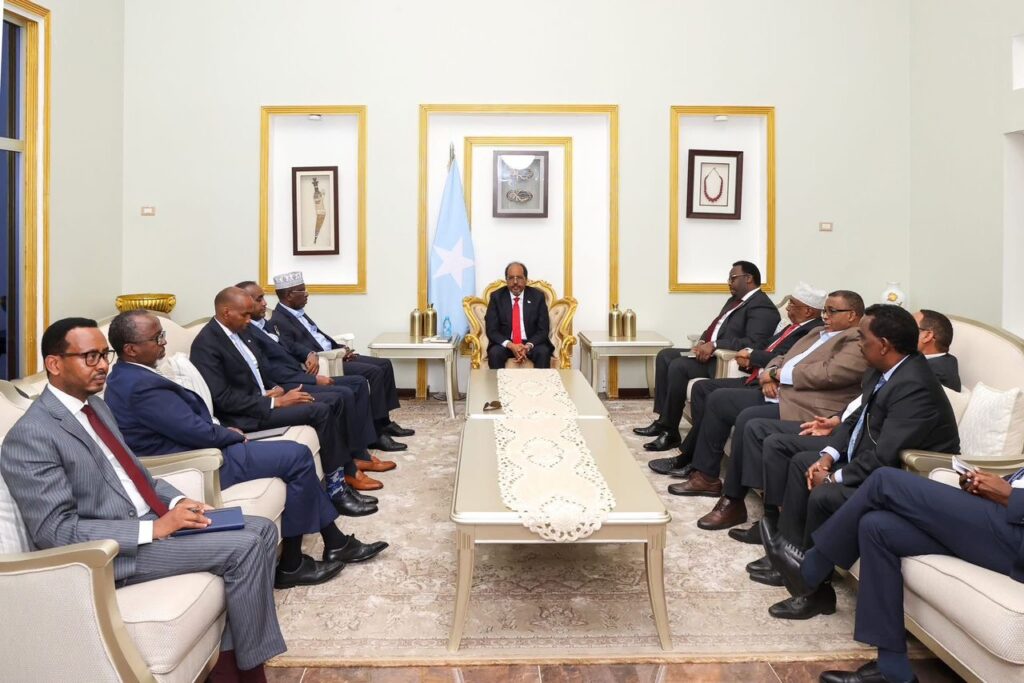A major political meeting began on Sunday at the Presidential Palace, Villa Somalia in Mogadishu between President Hassan Sheikh Mohamud and the Somali National Salvation Forum, a key opposition coalition led by former President Sharif Sheikh Ahmed.
This meeting, their fourth since the Forum’s formation, could become a turning point for Somalia’s political future.
The purpose of this meeting is to finalise a verbal agreement reached in earlier discussions about critical national issues. These include proposed changes to the Constitution, the structure and fairness of future elections, the length of the President’s term, and the question of whether the President should continue to have the power to hire and fire the Prime Minister without checks and balances.
These issues have sparked heated debate in political circles and among citizens.
In their last meeting, President Hassan Sheikh asked for 20 days to consult with leaders from the Federal Member States, Speakers of both Houses of Parliament, his ruling party Justice and Solidarity Party (JSP), and his Council of Ministers. That grace period has now passed, and the opposition Forum expects concrete answers and firm commitments from the President.
However, instead of finalising matters, the President, who has less than a year left of his current term, is now reportedly requesting even more extension. He wishes to delay the final agreement until after his upcoming trip to the United Nations General Assembly summit in New York, hoping to present the deal to Parliament once he returns.
This new request for delay has angered the opposition. They believe the President is using time as a tactic to avoid keeping his word.
According to trusted sources close to the Forum who spoke to Somali Stream, members plan to release a joint statement today declaring that the President has backed away from all the key points they had agreed on. They see this as a betrayal of trust and a step backward for Somali politics.
One of the most sensitive and divisive issues in the talks is whether the President should continue to have the sole power to appoint and dismiss the Prime Minister. The Forum has pushed for reforms to this article of the Constitution, arguing that it gives too much power to one person and weakens the balance of government. But President Hassan Sheikh has insisted that this clause should remain untouched, raising further tension in the negotiations.
Behind the scenes, the President has been holding private discussions with top officials, including party leaders, ministers, and regional presidents. But these meetings have not gone as smoothly as expected.
Key allies such as the Presidents of South West State, Abdiaziz Hassan Mohamed Laftagareen, and Galmudug, Ahmed Abdi Karie (Qoorqoor), are currently in Turkey and have not shown strong support for the President’s new approach. Both of them are believed to oppose halting the current direct public election process or scrapping constitutional reforms that have already started.
At the heart of this crisis is the President’s struggle to keep balance between two powerful groups; each pulling him in a different direction.
On one side is the opposition Forum, which wants fair elections and clear limits on the powers of federal and regional leaders. They especially oppose allowing Federal Member State leaders to handpick Members of Parliament, arguing this leads to corruption and unfair advantages in elections. On the other side are those very Federal Member State leaders, many of whom support the current system because it helps them maintain power. They are worried that any deal between the President and the Forum could undermine their ability to get re-elected.
This puts the President in a very difficult position. If he sides with the opposition Forum, he risks losing the support of the Federal Member States, which have been crucial political allies. But if he abandons the Forum and refuses to keep the promises he made earlier, then he risks sparking a fresh political crisis not only in Mogadishu but also in tense regions like Gedo, which are closely tied to his power base.
Worse still, international donors and foreign allies, who had recently stepped back from heavy involvement in Somali politics, could return with more pressure if they sense the country is slipping into deeper instability.
Adding to the President’s challenges are the worsening security situation and rising public anger. In recent months, some areas that had been freed from Al-Shabaab control have fallen back into militant hands. Meanwhile, his government faces accusations of corruption, misuse of public land, and poor service delivery. These issues have weakened public trust and made his position even more vulnerable.
No matter what decision the President makes after this meeting, the political cost will be high. If he agrees to the Forum’s demands, he may lose his allies in the regions. If he chooses to protect those allies by refusing reforms, then he may be blamed for killing a chance at national unity and democratic progress.
What is clear now is that Somalia stands at a crossroads. The outcome of this meeting could decide whether the country moves toward stronger, more inclusive governance or slips back into political division and mistrust.
The eyes of the Somali people and the world are now fixed on Villa Somalia, waiting to see what path President Hassan Sheikh Mohamud will choose.


